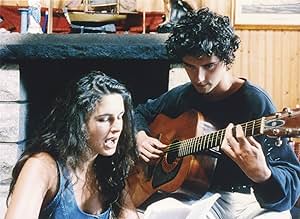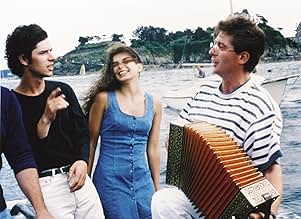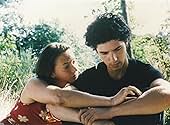AVALIAÇÃO DA IMDb
7,6/10
11 mil
SUA AVALIAÇÃO
Adicionar um enredo no seu idiomaAs a reserved young graduate vacations in a seaside town, he hopes his girlfriend will join him. But he ends up bonding with a local young woman whose female friend is also smitten with him.As a reserved young graduate vacations in a seaside town, he hopes his girlfriend will join him. But he ends up bonding with a local young woman whose female friend is also smitten with him.As a reserved young graduate vacations in a seaside town, he hopes his girlfriend will join him. But he ends up bonding with a local young woman whose female friend is also smitten with him.
- Prêmios
- 1 indicação no total
Avaliações em destaque
One of Rohmer's best. Gaspard (Melvil Poupaud) takes a month long vacation to a beach in Normandy, waiting for his more or less official girlfriend, the somewhat snotty Lena (Aurelia Nolin), to come. While waiting for her, he befriends the waitress and aspiring anthropologist Margot (Rohmer regular Amanda Langlet). Eventually, a relationship between the two develops, which seems to consists almost exclusively of long talks in the beach. But this is not all, since he soon also meets the somewhat promiscuous (but "principled") Solene (Gwaenelle Simon) in a disco. When Lena finally arrives to the resort, more than halfway into the movie, he finally finds himself in the position of having to choose one of the three. Rohmer would want us to think that Margot would be the best choice, and is difficult to disagree, since she's so charming and so willing to listen to him and even put up with him. It's amazing how Rohmer (who was in his late 70s when he directed this) is able to portray realistically how young people talk and interact. The final decision by Gaspard was a bit of a disappointment, but it was probably the more realistic possibility.
I couldn't agree more with the previous commenter from Germany in that we are so accustomed to dialogue and plot coming from Hollywood that when something this thoughtful and pure comes along, it just blows us away. I love the way Rohmer slowly guides the audience into the film, without a need for narration, only the sights and sounds of Brittany. When the first words of dialogue begin, it is so natural, but says so much about the characters. "I don't want to plan my life around money", Gaspard tells Margot, and you see him go through a process of writing his sea shantey, a really great little piece of music if you ask me. And to see a five minutes scene with Gaspard and Solene actually singing the song was just riveting. How does rohmer make something so banal on the surface so climactic? On paper, his stories and his characters don't really seem that interesting, but he adds something to them that make them resonate so deeply in me, and I am almost awestruck when it happens.
The great thing is that I can say that for almost all of Rohmer's films, especially those that make up the "Tales of the Four Seasons" I can't say I have a favorite because things like favorite or top films just go against the grain of what Rohmer is doing. I read somewhere that Rohmer has never made a masterpiece, in fact, he's never even attempted to. and yet, each character he's given us, Jeanne, Natascha and Igor from Spring, Gaspard and Margot from Summer, Isabelle, Magali, Gerard and Rosine from Autumn, and Felicie and Charles from Winter, are drawn so vividly that I sometimes forget that they are only characters and not people I call as personal friends.
In addition, I'd like to add that Amanda Langlet's characters seem to be the only "pure" characters in any of Rohmer's films, both as Pauline and Margot, She is beautiful, kind, intelligent, honest.....whereas his other characters, though likable and sympathetic, all have certain flaws.., some tell lies, some are neurotic, some judgemental, deceitful..self-indulgent, capricious.., so forth.
The great thing is that I can say that for almost all of Rohmer's films, especially those that make up the "Tales of the Four Seasons" I can't say I have a favorite because things like favorite or top films just go against the grain of what Rohmer is doing. I read somewhere that Rohmer has never made a masterpiece, in fact, he's never even attempted to. and yet, each character he's given us, Jeanne, Natascha and Igor from Spring, Gaspard and Margot from Summer, Isabelle, Magali, Gerard and Rosine from Autumn, and Felicie and Charles from Winter, are drawn so vividly that I sometimes forget that they are only characters and not people I call as personal friends.
In addition, I'd like to add that Amanda Langlet's characters seem to be the only "pure" characters in any of Rohmer's films, both as Pauline and Margot, She is beautiful, kind, intelligent, honest.....whereas his other characters, though likable and sympathetic, all have certain flaws.., some tell lies, some are neurotic, some judgemental, deceitful..self-indulgent, capricious.., so forth.
10aileigc
I'd say this film is an essay, regarding shyness, relations with the opposite sex, friendship and love. Being only based on the dialogues between different people, it's full of substance, and will definitely ask the viewer to think on the matter. I liked it so much because the people were real, the problem was real. Lots of people suffer problems of integration and self-achievement next to others and these have been thoroughly dealt with in the film.
Its main problems are how much is worth a summer romance next to a sincere friendship, and the importance of knowing exactly one's feelings and purposes (do I love her, or do I not ? Am I merely trying to have fun?).
In the end, we are faced with a line addressed to the main character that we can take for ourselves: "it was your own choice, think about it".
That's the main message: the director presents a problem, the dialogues delve deeply in several of its aspects but the conclusion of why things turned out as they did is left to us. In short, the viewer will certainly learn something from it, and that can even lead to deeper self-reflections on one's personal life. A valuable film, and an interesting lesson. Especially good for young people afraid of not finding that special one.
Its main problems are how much is worth a summer romance next to a sincere friendship, and the importance of knowing exactly one's feelings and purposes (do I love her, or do I not ? Am I merely trying to have fun?).
In the end, we are faced with a line addressed to the main character that we can take for ourselves: "it was your own choice, think about it".
That's the main message: the director presents a problem, the dialogues delve deeply in several of its aspects but the conclusion of why things turned out as they did is left to us. In short, the viewer will certainly learn something from it, and that can even lead to deeper self-reflections on one's personal life. A valuable film, and an interesting lesson. Especially good for young people afraid of not finding that special one.
10wobelix
First of all, let's say that Eric Rohmer deserves a 7 foot, solid gold Oscar, because he is one of the very last directors NOT to use Hollywood music. Or better: elevator muzak. He does not use music at all, unless someone within the story is singing or playing or listening.
No need here for external cues to explain to the viewer what's happening on screen. What a terrible shame Rohmer is the last to do so !!!
The cinematography of this SUMMER TALE flows magnificently, playing with the backdrop of beautiful Brittany. There are no hard or harsh cuts; no need for welding goggles to sit through this movie !
This is a small yet honest tale: the protagonists talk, rather than babble or throw comic book lines at each other.
A SUMMER'S TALE is not an epic, nor depicting a world changing event or some bigger than life humdrum. In all its subtlety and sincerity it is something that could happen to all of us.
Thank you Monsieur Eric Rohmer for yet another wonderful film.
No need here for external cues to explain to the viewer what's happening on screen. What a terrible shame Rohmer is the last to do so !!!
The cinematography of this SUMMER TALE flows magnificently, playing with the backdrop of beautiful Brittany. There are no hard or harsh cuts; no need for welding goggles to sit through this movie !
This is a small yet honest tale: the protagonists talk, rather than babble or throw comic book lines at each other.
A SUMMER'S TALE is not an epic, nor depicting a world changing event or some bigger than life humdrum. In all its subtlety and sincerity it is something that could happen to all of us.
Thank you Monsieur Eric Rohmer for yet another wonderful film.
10grubertm
Usually this movie is categorized as either a love story, comedy or drama. IMO it is all and none of these- for the simple reason that the plot does not really matter. What has impressed me about this movie is the realistic way the characters are portrayed. If in a Hollywood movie a character has merely two motivations acting on him this is already interpreted as a "highly complex personality". So the common movie shows characters with a 1D psyche which contradicts the many facets of Self and the elusive, fuzzy nature of personality that one usually has or experiences. On the other hand there are movies which emphasize the highly artistic side by stuffing in all kinds of metaphors, analogies, images, etc. While this might make for an interesting intellectual puzzle- to me itïs just dull because this avoids the medium's strength of portraying intense situations. Just like a book written in Latin: it can be fun deciphering it- but it certainly does not make a good read. With these extremes out of the way- back to _Conte d'ete_. It's presented in a diary-like way with the protagonist either on his own or in company of one of the girls he is in love with. There are a few group scenes but thankfully they are rare and the main focus is on dialogues between the different personalities. All of the characters appear convinced of having a static self at the time of speaking. Yet throughout the movie one can see quite rapid changes going on which, just as in real life are not completely directed at a specific goal (IMO linear character development only takes place in bad short stories). So while each character remains mostly unaware about his/her individual changes they are made obvious by the characters describing each other. The dialogues are extremely lifelike- with all the mechanisms of exaggerating, rationalizing, white lies, etc.
What makes this movie a piece of art instead of just a diary film adaption is the timelessness with which it is presented. The images and characters are somewhat blurred or softened (_not_ in a visual sense!) as a fading memory might be. There are dates inserted every few minutes giving the plot a duration of about two weeks. Had this not been done it would be hard to tell whether the time span covered is 3 days or 3 years. Despite having an elaborate personality the characters at the same time remain general (archetypical, if you will) and personally I find it very easy to identify friends with these characters- which IMO is intended.
To sum it up, I see this movie as an evocative exercise in applied psychology reflecting or focusing life towards the audience. While there are some recurring commentaries the film is for the most part free of moral judgement.
There are two points of negative critic: - the otherwise excellent acting (which does not look like acting) is limited by the somewhat uninspired gestures of the main actor (Melvil Poupaud). - the Deus Ex Machina ending which is used to finish an otherwise endless story
What makes this movie a piece of art instead of just a diary film adaption is the timelessness with which it is presented. The images and characters are somewhat blurred or softened (_not_ in a visual sense!) as a fading memory might be. There are dates inserted every few minutes giving the plot a duration of about two weeks. Had this not been done it would be hard to tell whether the time span covered is 3 days or 3 years. Despite having an elaborate personality the characters at the same time remain general (archetypical, if you will) and personally I find it very easy to identify friends with these characters- which IMO is intended.
To sum it up, I see this movie as an evocative exercise in applied psychology reflecting or focusing life towards the audience. While there are some recurring commentaries the film is for the most part free of moral judgement.
There are two points of negative critic: - the otherwise excellent acting (which does not look like acting) is limited by the somewhat uninspired gestures of the main actor (Melvil Poupaud). - the Deus Ex Machina ending which is used to finish an otherwise endless story
Você sabia?
- CuriosidadesThis is, perhaps, the film in which Rohmer - notoriously silent about his private life - came closest to autobiography, filling the story with discrete traces and allusions to his own past. "Of all the films I've made, I think this is the most personal vehicle. Everything that is in this film is true. They are either things that I experienced in my youth or things that I noticed. [...] I have carried with me the story of this film, which was in part inspired by events that occurred during my adolescence, for a long time."
- Antoine de Baecque & Noël Herpe, "Éric Rohmer: A Biography" (New York: Columbia University Press, 2016), p. 458.
- ConexõesFeatured in The Movie Show: Episode dated 16 April 1997 (1997)
- Trilhas sonorasFille de corsaire
Performed by Sebastien Erms
Principais escolhas
Faça login para avaliar e ver a lista de recomendações personalizadas
- How long is A Summer's Tale?Fornecido pela Alexa
Detalhes
- Data de lançamento
- País de origem
- Idioma
- Também conhecido como
- A Summer's Tale
- Locações de filme
- Rue de la Malouine, Dinard, Ille-et-Vilaine, França(Solene's cousins house)
- Empresas de produção
- Consulte mais créditos da empresa na IMDbPro
Bilheteria
- Faturamento bruto nos EUA e Canadá
- US$ 198.126
- Fim de semana de estreia nos EUA e Canadá
- US$ 12.863
- 22 de jun. de 2014
- Faturamento bruto mundial
- US$ 198.706
- Tempo de duração1 hora 53 minutos
- Cor
- Mixagem de som
Contribua para esta página
Sugerir uma alteração ou adicionar conteúdo ausente

Principal brecha
By what name was Conto de Verão (1996) officially released in India in English?
Responda





















